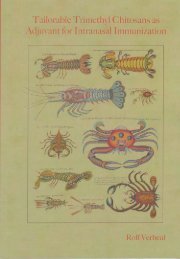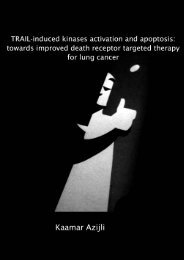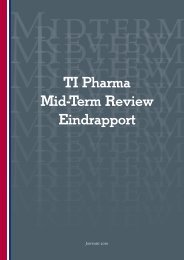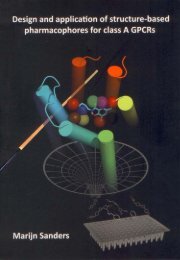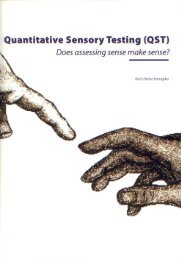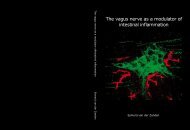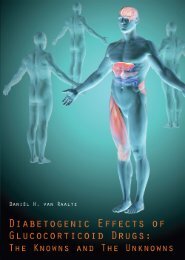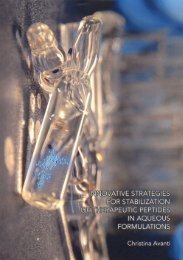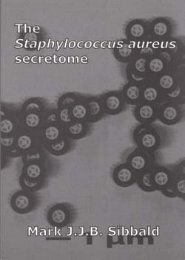Experimental infection and protection against ... - TI Pharma
Experimental infection and protection against ... - TI Pharma
Experimental infection and protection against ... - TI Pharma
You also want an ePaper? Increase the reach of your titles
YUMPU automatically turns print PDFs into web optimized ePapers that Google loves.
208 Chapter 10<br />
immune modulating effects of chloroquine might have enhanced the<br />
development of protective immune responses during the immunisation process<br />
[27].<br />
While Pf-specific antibody responses were negligible <strong>and</strong> declining (data not<br />
shown), we found a sustained Pf-specific T cell IFNγ re-call response that<br />
persisted over years <strong>and</strong> paralleled the sustained <strong>protection</strong> in all six immunised<br />
volunteers. The two volunteers with delayed patency did not show a distinctly<br />
different T cell response as compared to the fully protected individuals.<br />
However, a three to six day delay of exponentially growing parasites equals one<br />
to three logs (e.g. >95%) reduction in parasite burden. The variation in the level<br />
of <strong>protection</strong> between the volunteers might thus be relatively small. A large<br />
body of evidence supports the view that IFNγ responses are protective <strong>against</strong> Pf<br />
<strong>infection</strong>, although naturally acquired T-cell responses to individual antigens<br />
wane after several years of non-exposure [28]. The functional importance of<br />
IFNγ–producing cells, however, still needs to be established in larger study<br />
groups.<br />
We detected cellular responses to both sporozoites <strong>and</strong> blood-stage parasites<br />
with remarkably similar dynamics, although responses to blood-stage parasites<br />
were consistently higher than to sporozoites. Whether such responses are<br />
directed <strong>against</strong> both pre-erythrocytic <strong>and</strong> blood-stage antigens or represent<br />
cross-reactivity, will require further detailed immunological analysis. In either<br />
case, the lack of blood-stage parasites in the fully protected volunteers seems to<br />
indicate a primarily pre-erythrocytic immunological effector mechanism.<br />
<strong>Experimental</strong> malaria <strong>infection</strong>s provide a unique opportunity to study<br />
<strong>protection</strong> <strong>against</strong> Pf malaria in a controlled setting [29]. This trial reconfirms a<br />
solid correlation between the appearance of clinical symptoms <strong>and</strong> the presence<br />
of microscopically detectable blood stage parasites, including in volunteers with<br />
delayed patency. Clinical symptoms <strong>and</strong> the pattern of parasitemia by Q-PCR are<br />
very consistent between <strong>and</strong> within study groups illustrating the power of this<br />
experimental <strong>infection</strong> model (Chapter 6, [9]). Protected volunteers also<br />
reported some adverse events, without objective signs of inflammation. Possibly<br />
these events reflect natural fluctuations of subjective health perception.<br />
The occurrence of a cardiac event following experimental challenge after a<br />
phase I malaria vaccine trial in the past has necessitated an increased vigilance<br />
<strong>and</strong> surveillance of cardiac <strong>and</strong> coagulation markers [12]. We found increased<br />
concentrations of d-dimer that paralleled the increases in inflammatory markers,



